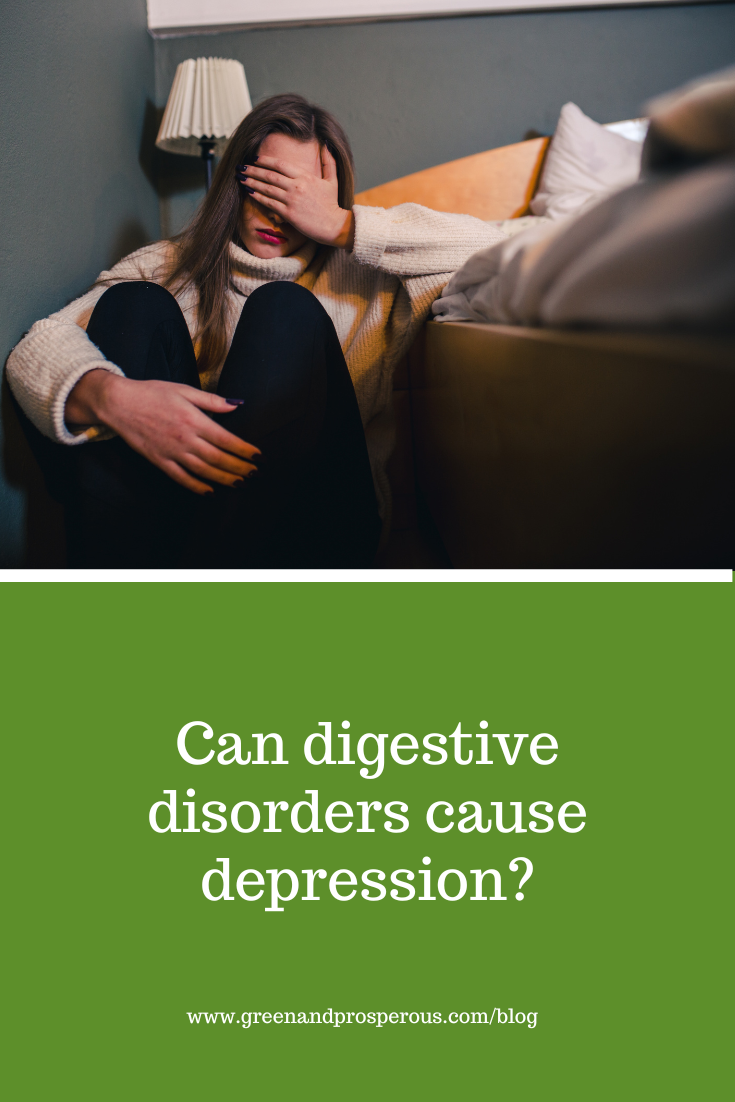Can digestive disorders cause depression?
/The link between digestive disorders and depression is increasingly being recognized as an important factor in mental health. Previous studies have shown that there is a connection between digestive issues and mood, with people suffering from gastrointestinal disorders being more likely to experience symptoms of depression. This article will explore the connection between digestive problems and depression, how the two conditions interact, and what treatments are available for both.
The Gut-Brain Connection
Research has shown that there is a direct link between our mental state, such as anxiety, stress or depression, and physical symptoms in the digestive tract such as bloating, diarrhea or constipation.
The assumption in clinical research has long been that mental illness or emotional disorders can lead to digestive problems. In other words, many researchers and physicians believed that the mind could inhibit the body's ability to function properly. The mind and the gastrointestinal system communicate with each other through neural, endocrine, and immune system networks in the body. Scientists refer to this as the 'gut-brain axis.' These lines of communication between the gut and the brain are bi-directional, meaning that the brain signals to the gut microbiome and the gut microbiome signals to the brain. The communications between these two areas of the body are complex and just beginning to be understood.
The communications that take place along the gut-brain axis work to monitor and regulate intestinal functions and to link cognitive and emotional functions of the brain with immune system operations, control of materials passing through intestinal cell walls into the rest of the body, the functioning of movements up and down the digestive tract (from swallowing to elimination), and the production and functioning of gastrointestinal hormones.
Many studies have demonstrated that people who suffer from mental illness, including anxiety or depression are much more likely to experience gastrointestinal symptoms, including disorders ranging from irritable bowel syndrome (IBS) and inflammatory bowel disease. Psychological stressors can weaken the pathways of the gut-brain axis, leading to physical changes in the gut microbiome. However, can digestive orders bring about the chemical imbalances in the brain that lead to clinical depression?
Digestive Disorders and Depression
There is growing evidence to suggest that indeed, digestive disorders can lead to depression, as well as other psychological problems. For example, people with IBS are up to four times more likely than people without IBS to experience anxiety and depression. Similarly, those who suffer from inflammatory bowel disease (IBD) have an increased risk of developing depression and anxiety compared to those without the condition. Gastrointestinal disorders seemingly go hand in hand with depressive symptoms, diminishing the quality of life for people who suffer from these two disorders.
There are several potential mechanisms that could explain this connection. One relates to the causal mechanism.
The gut microbiome is a complex community of microorganisms that plays an important role in regulating many bodily functions, including mood. The gut and brain are closely related. The gut has even been referred to as the body's second brain due to its high number of neurons (more than exist in the spinal cord) and its use of many of the same neurotransmitters as the brain. It is not surprising then, that conditions like depression and constipation may share a common cause rooted in low serotonin levels. Serotonin is an important neurotransmitter that affects mood and is used by neurons in both the gut and brain.
A second possibility is that inflammation in the gut caused by digestive disorders can trigger an immune response that affects the brain, leading to changes in mood and behavior. Since the enteric nervous system (the "brain in your gut"), which consists of two thin layers of more than 100 million nerve cells running along the GI tract, communicates with your brain on a regular basis, it stands to reason that the gut could be sending signals to the immune system that trigger changes in your mood.
A third possibility is that disruptions in the gastrointestinal conditions, namely the gut microbiome, which can occur with certain digestive disorders, can impact neurotransmitter levels in the brain (i.e., chemical signals such as dopamine, endorphins, or serotonin) and lead to depression.
Treatment Options
There are a several treatment options available for people suffering from digestive disorders that have brought on symptoms of clinical depression. Some of those treatments include Cognitive-behavioral therapy (CBT), antidepressants, and dietary supplements such as probiotics.
Cognitive-behavioral therapy (CBT)
Cognitive-behavioral therapy (CBT) is a type of psychotherapy that can help individuals identify, monitor and change negative thought patterns and behaviors. This treatment approach focuses on helping people learn coping skills to manage symptoms of depression and anxiety, as well as develop strategies for improving their overall mental health. CBT can be particularly helpful for those with digestive disorders because it enables them to better understand how their thoughts and behaviors may be contributing to their physical symptoms, and vice versa.
Antidepressants
Antidepressants are medications that can help alleviate symptoms of depression by altering the levels of certain neurotransmitters in the brain. Antidepressant medication may also be prescribed alongside CBT. These medications can be effective for people with digestive disorders who are experiencing depression or anxiety as a result. However, it is important to note that antidepressants may have side effects and should only be taken under the guidance of a healthcare professional. They also should not be taken indefinitely, as some have been known to cause suicidal ideations.
Dietary Supplements
An increasing number of people are taking probiotics as a digestive health supplement. Probiotics are live microorganisms, such as bacteria or yeast, that may help to restore the balance of beneficial bacteria in the gut. In recent years, probiotics have been studied for their possible role in treating digestive disorders and depression.
While the evidence is still preliminary, preliminary research suggests that probiotics may be an effective remedy for digestive issues and may also help to relieve symptoms of depression. However, it is important to note that not all probiotics are created equal, and more research is needed to determine which strains of bacteria are most effective for specific conditions.
Other supplements and herbs, such as St. John's wort, omega-3 fatty acids and vitamin D, also have potential benefits in treating both digestive disorders and depression.
Still processing: the gut-brain link
While the idea of a gut-brain connection is not new, research into the mechanisms behind it is still ongoing. There is still much we don't know about how the gut works, or about the ways in which the digestive system influences the functioning of the brain. New clinical studies have produced promising results for understanding exactly how the gut communicates with and influences the functioning of the brain, and the role of serotonin -- 95% of which is produced in the gut -- in this process.
like this? Please pin!
It's important for individuals experiencing symptoms of both digestive disorders and depression to seek medical attention from healthcare professionals who can provide proper diagnosis and treatment options.
Treatment options such as cognitive-behavioral therapy, antidepressants, and dietary supplements may be effective in managing symptoms of both conditions. Other effective remedies that you can manage at home include maintaining a healthy diet (including limiting the amount of processed foods you eat), exercising regularly, and practicing stress-reducing techniques such as meditation, mindfulness or yoga. As research into the gut-brain connection continues, there may be more targeted treatments available in the future for those experiencing depression as a result of digestive disorders.











































The link between digestive disorders and depression is increasingly being recognized as an important factor in mental health. Previous studies have shown that there is a connection between digestive issues and mood, with people suffering from gastrointestinal disorders being more likely to experience symptoms of depression. This article will explore the connection between digestive problems and depression, how the two conditions interact, and what treatments are available for both.